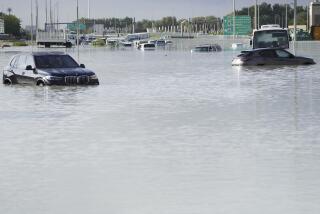Dust storms blanket region of Iran, disrupting life
Blinding dust storms have enveloped much of southwestern Iran, prompting health warnings and resulting in closed schools and offices, canceled flights and scattered protests, Iranian media is reporting.
The official Islamic Republic News Agency said that health officials were warning residents with heart and respiratory problems to remain in their homes.
Hardest hit is the southwestern province of Khuzestan. Flights to and from the provincial capital, Ahvaz, have been canceled as massive dust clouds have swept in from the west, Iranian media reported.
Various reports have indicated that the amount of dust in the air is from 30 to 60 times the healthy level.
The storms began two weeks ago but have intensified in recent days, according to media reports here.
Authorities have distributed tens of thousands of surgical masks and more than 26,000 gallons of milk in Ahvaz, a city of more than 1 million, local media reported. Health officials say drinking milk is beneficial for people with respiratory ailments.
Motorists in the vast zone affected have used headlights even in the daytime because of the lack of visibility, reported Iran’s Mehr News.
One news agency reported that six protesters were arrested in Ahvaz at an officially sanctioned demonstration. Participants were calling for greater controls on water usage to stem what environmentalists call the growing desertification of the arid region, where lagoons and wetlands have been drying up in recent years. Some have theorized that global warming may also be a factor.
Activists have also called on neighboring Iraq — where much of the dust is said to originate — to take measures to avert the loss of marshlands and the spread of desert terrain.
Officials say dust storms have grown in frequency and intensity in recent years, even reaching Tehran, the capital.
Among the flights canceled, local media reported, was one that was to transport a top environmental official, Masoumeh Ebtekar, to Ahvaz to assess the problem.
Mostaghim is a special correspondent. Times staff writer Patrick J. McDonnell in Beirut contributed to this report.
Follow McDonnell on Twitter at @mcdneville for news out of the Middle East
More to Read
Sign up for Essential California
The most important California stories and recommendations in your inbox every morning.
You may occasionally receive promotional content from the Los Angeles Times.




